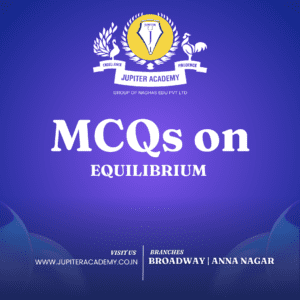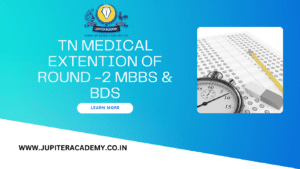TN Medical 2024 Counseling: Extension of Round 2 for MBBS...
Read MoreNEET MCQS ON EQUILIBRIUM

Equilibrium is an important topic in the NEET exam. It is one of the core concepts of physical chemistry and has applications in many other areas of chemistry, such as organic chemistry, inorganic chemistry, and biochemistry.
Thank you for reading this post, don't forget to subscribe!Chemical equilibrium is the state in which the concentrations of reactants and products in a reversible chemical reaction remain constant over time. This is because the rate of the forward reaction is equal to the rate of the reverse reaction.
Chemical equilibrium is an important topic in the NEET exam because it is essential for understanding many chemical processes that occur in the body, such as the metabolism of food and the regulation of blood pH. It is also important for understanding industrial processes, such as the production of ammonia and sulfuric acid.
Here are some of the important topics in chemical equilibrium that are covered in the NEET exam:
- The concept of chemical equilibrium and dynamic equilibrium
- The law of chemical equilibrium and the equilibrium constant
- Homogeneous and heterogeneous equilibria
- Equilibrium constant in gaseous systems
- Le Chatelier’s principle and the effects of changes in concentration, pressure, temperature, and the addition of a catalyst on equilibrium
- Solubility equilibria
- Acid-base equilibria
- Redox equilibria
Here are some multiple-choice questions (MCQs) related to chemical equilibrium that you might find useful for NEET exam preparation:
1. In a chemical equilibrium, which of the following statements is true?
a) The concentration of reactants is constant.
b) The rate of the forward reaction is equal to the rate of the reverse reaction.
c) The equilibrium constant (Kc) is variable.
d) Equilibrium can only be reached in closed systems.
2. Which factor does NOT affect the equilibrium constant (Kc) for a given reaction?
a) Temperature
b) Pressure
c) Concentration of reactants and products
d) Catalyst presence
3. For the reaction N2(g) + 3H2(g) ⇌ 2NH3(g), if you increase the pressure, what will happen to the equilibrium position?
a) Shift to the right (towards products)
b) Shift to the left (towards reactants)
c) No shift
d) It depends on the initial concentrations.
4. If you increase the temperature of an endothermic reaction at equilibrium, what will happen to the equilibrium constant (Kc)?
a) Kc increases.
b) Kc decreases.
c) Kc remains the same.
d) It depends on the specific reaction.
5. Which of the following statements is true regarding Le Chatelier’s principle?
a) It predicts the exact position of equilibrium.
b) It explains how a system at equilibrium responds to changes in conditions.
c) It only applies to reactions in gaseous phase.
d) It is not applicable to chemical reactions.
6. What happens to the concentration of reactants and products at equilibrium for a reversible reaction?
a) The concentration of reactants is higher than the concentration of products.
b) The concentration of products is higher than the concentration of reactants.
c) The concentration of reactants is equal to the concentration of products.
d) The concentrations vary continuously.
7. Which of the following will NOT disturb the equilibrium of a reaction?
a) Adding an inert gas at constant volume.
b) Increasing the pressure for a gaseous reaction with fewer moles of gas on the product side.
c) Increasing the temperature for an exothermic reaction.
d) Adding a catalyst.
Answers:
1. b) The rate of the forward reaction is equal to the rate of the reverse reaction.
2. d) Catalyst presence
3. a) Shift to the right (towards products)
4. a) Kc increases.
5. b) It explains how a system at equilibrium responds to changes in conditions.
6. c) The concentration of reactants is equal to the concentration of products.
7. a) Adding an inert gas at constant volume.
These questions should help you practice your understanding of chemical equilibrium concepts for the NEET exam.
JEE MCQS ON EQUILIBRIUM
Here are some multiple-choice questions (MCQs) related to chemical equilibrium, which is a topic commonly encountered in the JEE (Joint Entrance Examination) for engineering admissions in India. These questions vary in difficulty level:
1. In the equilibrium reaction: N2(g) + 3H2(g) ⇌ 2NH3(g), if the concentration of N2 is increased while keeping the volumes and temperature constant, what will happen to the equilibrium position?
a) The equilibrium will shift to the left.
b) The equilibrium will shift to the right.
c) The equilibrium will not shift.
d) The equilibrium will shift in an unpredictable manner.
2. Which of the following factors does NOT affect the equilibrium constant (Kc) for a given reaction?
a) Temperature
b) Concentration of reactants
c) Presence of a catalyst
d) Pressure (for gaseous reactions)
3. What is the expression for the equilibrium constant (Kc) for the reaction: A(g) + B(g) ⇌ C(g) + D(g)?
a) [A][B] / [C][D]
b) [C][D] / [A][B]
c) [C][D] / [A][B] + [C]
d) [A][B] / [C][D] + [A]
4. If the value of the equilibrium constant (Kc) for a reaction is much greater than 1, what does this indicate about the position of equilibrium?
a) The equilibrium favors the reactants.
b) The equilibrium favors the products.
c) The equilibrium is perfectly balanced.
d) The equilibrium cannot be determined from Kc alone.
5. Which of the following statements is true regarding Le Chatelier’s principle?
a) Increasing the temperature of an exothermic reaction shifts the equilibrium to the left.
b) Adding a catalyst to a reaction changes the equilibrium constant (Kc).
c) Increasing the pressure of a gaseous reaction always shifts the equilibrium to the right.
d) If you decrease the concentration of a reactant, the equilibrium will shift to the right.
6. When a system is at equilibrium,
a) Both the forward and reverse reactions have stopped.
b) The concentrations of reactants and products are always equal.
c) The rates of the forward and reverse reactions are equal.
d) The system is at its highest energy state.
7. In the reaction: N2O4(g) ⇌ 2NO2(g), if the pressure is increased, what will happen to the color of the gas in the container?
a) The color will become darker.
b) The color will become lighter.
c) The color will remain the same.
d) The color change is unpredictable.
Answers:
1. a) The equilibrium will shift to the left.
2. c) Presence of a catalyst
3. a) [A][B] / [C][D]
4. b) The equilibrium favors the products.
5. d) If you decrease the concentration of a reactant, the equilibrium will shift to the right.
6. c) The rates of the forward and reverse reactions are equal.
7. a) The color will become darker.
These questions are meant for practice and may not represent the exact format or difficulty level of questions in the JEE exam. Be sure to study the topic of chemical equilibrium thoroughly for the exam.
Students who are preparing for the NEET | JEE exam should make sure that they have a good understanding of all of these topics. They should also practice solving problems related to chemical equilibrium.
Here are some tips for preparing for chemical equilibrium in the NEET | JEE exam:
- Read the NCERT textbook carefully and make notes on all of the important concepts.
- Solve the problems given at the end of each chapter in the NCERT textbook.
- Practice solving problems from previous years’ NEET | JEE papers.
- If you are having difficulty with any particular topic, seek help from a teacher or tutor.
By following these tips, you can ensure that you are well-prepared for the chemical equilibrium portion of the NEET | JEE exam.
TENTATIVE ROUND-II COUNSELLING SCHEDULE FOR ADMISSION TO MBBS/BDS
Registration Starts from 11-09-2024 10:00 A.M to 13-09-2024 05:00 P.M....
Read MoreNEET UG 2024 – MCC Extends Choice Submission Date
Now Candidates Can Do Choice Filling Till 11 September Thank...
Read MoreTN MEDICAL PROVISIONAL RESULTS ROUND-1- UG MEDICAL AND DENTAL – RELEASED
TN MEDICAL PROVISIONAL RESULTS ROUND-1- UG MEDICAL AND DENTAL ADMISSION...
Read MoreNEET MCQS ON EQUILIBRIUM NEET MCQS ON EQUILIBRIUM NEET MCQS ON EQUILIBRIUM NEET MCQS ON EQUILIBRIUM NEET MCQS ON EQUILIBRIUM NEET MCQS ON EQUILIBRIUM NEET MCQS ON EQUILIBRIUM NEET MCQS ON EQUILIBRIUM NEET MCQS ON EQUILIBRIUM NEET MCQS ON EQUILIBRIUM NEET MCQS ON EQUILIBRIUM
JEE MCQS ON EQUILIBRIUM JEE MCQS ON EQUILIBRIUM JEE MCQS ON EQUILIBRIUM JEE MCQS ON EQUILIBRIUM JEE MCQS ON EQUILIBRIUM JEE MCQS ON EQUILIBRIUM JEE MCQS ON EQUILIBRIUM JEE MCQS ON EQUILIBRIUM JEE MCQS ON EQUILIBRIUM JEE MCQS ON EQUILIBRIUM JEE MCQS ON EQUILIBRIUM






